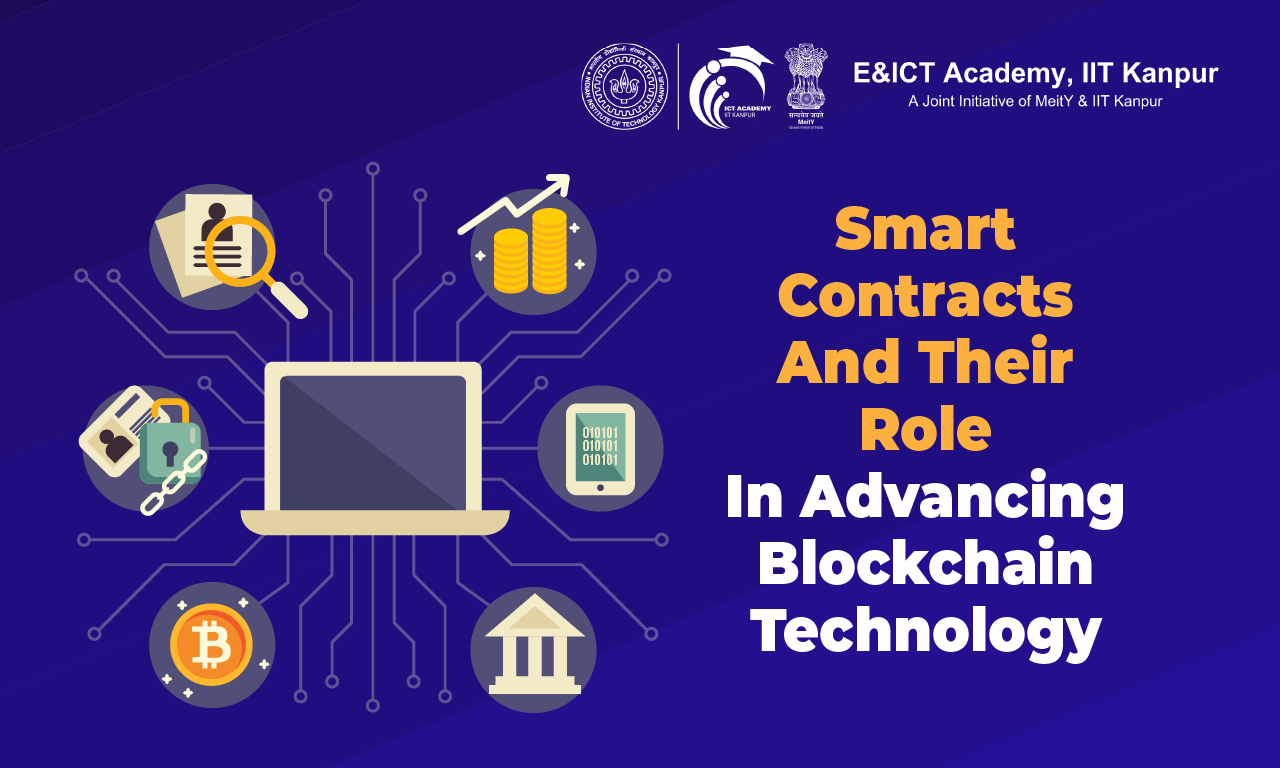Smart Contracts and Their Role in Advancing Blockchain Technology
- Date July 31, 2023
The concept of smart contracts has been around for quite some time, but it wasn’t until the rise of blockchain technology that their true potential was realized. The innovative technological marvel is reshaping the way we conduct business and interact with one another in the digital realm. Imagine a future where agreements are automatically executed, verified, and enforced without intermediaries or third-party interventions.
Smart contracts have the potential to transform industries ranging from finance and real estate to supply chain management and beyond. By eliminating intermediaries and reducing costs, smart contracts can improve efficiency, transparency, and security in various business processes. But what exactly do smart contracts mean, and how do they work? In this guide, we will explore the concept of smart contracts, their role in advancing blockchain technology, and the potential impact they could have on the future of business.
What Are Smart Contracts?
Smart contracts are self-executing programs that eliminate the need for intermediaries and provide a secure and transparent way to conduct transactions.
In other words, they are self-executing contracts with the terms of the agreement directly embedded into lines of code. These lines of code are stored on a decentralized blockchain network, ensuring transparency, immutability, and security. By leveraging the power of blockchain technology, smart contracts eliminate the need for traditional paper-based contracts, which are prone to errors, delays, and disputes. They automate the entire process, from contract creation to fulfillment, ensuring that all parties are held accountable for their obligations.
How do They Work?
Smart contracts are like digital agreements that operate on blockchain technology. They work by using straightforward “if/when…then…” statements written in code. Once certain conditions are met and verified by a network of computers, specific actions are executed. These actions can range from transferring funds to the correct recipients, registering a vehicle, sending notifications, to even issuing tickets. The beauty of smart contracts lies in their immutability: once a transaction is completed, it becomes permanent on the blockchain and can’t be altered. Moreover, only authorized parties have access to the transaction details.
Smart contracts are designed as classes, encompassing elements such as state variables, functions, function modifiers, events, and structures. These components work in harmony to execute and regulate events and actions based on the terms of the contract. Think of a smart contract as a proactive entity, actively processing inputs and generating outputs through its predefined functions.
For example, the constructor function plays a crucial role in creating a smart contract. By invoking this function through a transaction, the smart contract is instantiated within the blockchain, and the transaction’s sender becomes the smart contract’s owner. This owner holds the authority to manage and control the contract’s lifecycle.
Additionally, smart contracts can contain a self-destruct function. This function allows the owner to terminate the contract when necessary, providing control over the contract’s existence.
States and functions are the backbones of a smart contract. States refer to variables that hold data or information, such as the owner’s wallet address or other pertinent details. Within states, there are two types: constant states, which remain immutable, and writable states, which allow for modifications and updates on the blockchain.
On the other hand, functions are a smart contract’s dynamic components. They execute specific actions, whether it’s reading data or modifying states. There are two primary types of functions: (i) Read-only functions and (ii) Write functions. Read-only functions do not require additional computational resources to execute, while write functions require gas as they involve state transitions that need to be recorded in new blocks on the blockchain. These gas requirements ensure the integrity and finite execution of smart contracts.
To deploy a smart contract, the constructor function is invoked by submitting a transaction to the blockchain network. This triggers the execution of the constructor function, resulting in storing the final code for the smart contract on the blockchain. Once deployed, the creator of the smart contract receives essential parameters, such as the contract address. This address allows users to interact with the smart contract by sending transactions and invoking its available functions.
How are Smart Contracts Advancing the Blockchain Technology?
Smart contracts are pivotal in advancing blockchain technology on multiple fronts. Here are some key ways in which smart contracts are driving the progress and evolution of blockchain:
- Eliminating Intermediaries: One of the most remarkable aspects of smart contracts is their ability to facilitate trust in an inherently trustless environment. By eliminating intermediaries, such as lawyers or escrow agents, smart contracts empower individuals and businesses to interact directly with each other, bypassing the need for middlemen. This saves time and money and reduces the risk of fraud and manipulation. With smart contracts, trust is built into the system itself, as the code ensures that the terms of the agreement are transparent, immutable, and executed exactly as intended.
- Highly Efficient: Blockchain technology has the potential to completely disrupt traditional financial transactions by removing intermediaries. The rise of decentralized finance (DeFi) has brought attention to the power of peer-to-peer (P2P) cryptocurrency transactions, exemplified by renowned cryptocurrencies like Bitcoin and Ethereum. With the integration of smart contracts, digital currencies can significantly reduce the time and costs associated with settling transactions. Additionally, smart contracts demonstrate great promise in automating manual banking processes, which were traditionally handled by financial institutions. Tasks such as evaluating loan eligibility, processing insurance claims, and ensuring regulatory compliance can now be executed efficiently and securely through smart contracts.
- Facilitating Transparency: The impact of blockchain technology on consumer interactions with their favorite entertainment options is immense. Take nonfungible tokens (NFTs), for instance, which revolutionize the authentication of digital asset ownership. By leveraging smart contracts, the buying, selling, and trading of NFTs can be seamlessly streamlined. Moreover, there is growing interest in utilizing smart contracts to facilitate direct payments to independent creators, such as authors, musicians, and filmmakers. This automation eliminates the need for intermediaries to handle royalty payments, empowering creators and ensuring faster, more transparent transactions.
- A Better Tomorrow: Smart contracts in blockchain technology present a new era of possibilities in establishing trust, executing agreements, and transacting in the digital age. They empower individuals and businesses, democratize access to services, and redefine what is possible. As we navigate the ever-evolving landscape of the digital revolution, blockchain and smart contracts pave the way for a more transparent, decentralized, and inclusive future.
Challenges of Smart Contracts
Smart contracts on blockchain have ushered in a new era of automation and efficiency, revolutionizing the way businesses operate. While they offer numerous advantages, it’s essential to acknowledge and tackle the challenges that come along:
- Compliance Complexity: As regulations for smart contracts and blockchain technology are still evolving, organizations must navigate uncharted territory. Scrutiny is on the rise, accompanied by potential threats such as network attacks and crypto-jacking. To safeguard against these risks, proactive measures like creating robust corporate compliance policies can be a saving grace.
- Data Integrity Risks: Although smart contracts automate data processing, the risk of dishonest or inaccurate data cannot be ignored. Even a single misstep can trigger a smart contract, leading to undesirable outcomes. To mitigate this, organizations must prioritize stringent data validation protocols, ensuring the information’s trustworthiness in their smart contracts.
- Logic Vulnerabilities: While the logic behind blockchain technology is impressive, bad actors continue to exploit vulnerabilities. Logic hacks can jeopardize not only cryptocurrencies but also smart contracts. Airtight security measures and code integrity must be upheld to fortify enterprise blockchain projects to keep potential threats at bay.
- Scalability Struggles: Scalability poses a formidable challenge, particularly for public blockchains. As transaction volumes surge, the strain on blockchain nodes increases, demanding substantial computing power, electricity, and bandwidth consumption. However, innovative solutions like sharding and proof-of-stake algorithms hold promise in alleviating scalability concerns, paving the way for smoother and more efficient operations.
- Security Concerns: Security remains a paramount issue in smart contracts. Even with the inherent security benefits of blockchain, poorly coded or neglected smart contracts can expose organizations to significant risks. Establishing a robust governance model and embracing secure coding practices become imperative shields against potential breaches and data compromises.
- Standardization Dilemmas: Standardization presents yet another hurdle. When collaborating with external partners, data collection and processing standards variations can impede seamless transactions within an enterprise blockchain ecosystem. Well-designed smart contracts can bridge these data disparities, promoting harmonious business communications and transactions while upholding quality and consistency.
- Sustainability Issues: Sustainability is an increasingly crucial consideration in today’s world. Public blockchains, notorious for their colossal carbon footprints, raise concerns about their environmental impact. Enterprises must explore eco-friendly alternatives and adopt conscientious maintenance practices to minimize their ecological footprint and demonstrate a commitment to sustainability.
Final Words
Smart contracts are reshaping industries and revolutionizing the way we conduct business in the digital realm. They offer numerous advantages by automating agreements, eliminating intermediaries, and ensuring transparency and security. However, compliance complexity, data integrity risks, scalability issues, and security concerns must be addressed. Despite these challenges, smart contracts hold great potential to transform industries, enhance efficiency, and foster trust in a digital world. As organizations navigate the evolving landscape of the digital revolution, embracing smart contracts and blockchain technology can lead to a more transparent, secure, and inclusive future for businesses and individuals.
Previous post




